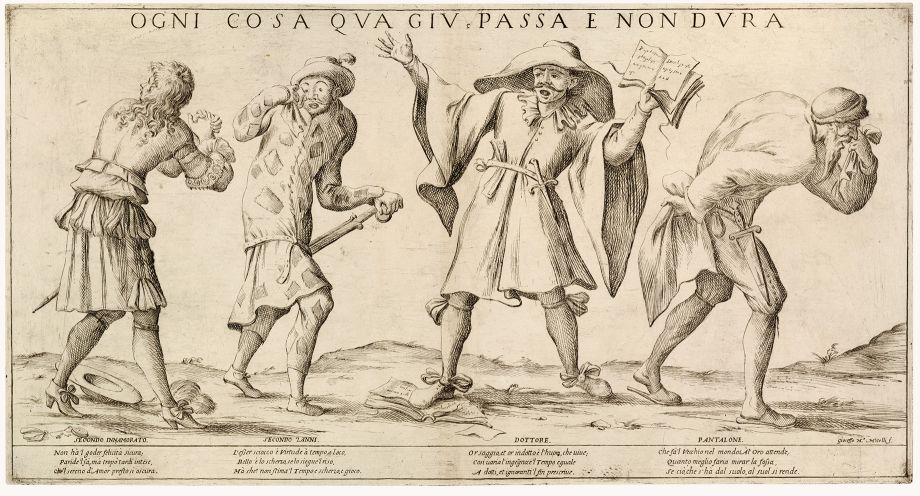

Can I propose a risky statement? Here it comes!
The Commedia dell’Arte can be considered a low-level cultural entertainment (if we compare it with the “classic theatre plays”) which we can see quite similar to the modern popular “novelas” so worldwide recognized as “simple entertainment”, entertainment for the masses.
… but unlike the novelas, the Commedia dell’Arte was mostly founded on the improvisation on stage, although some rigid rules applied: the “canovaccio”.
It would quite differ from the Shakespearean theatre of later times, along with all the rest.
Of course this might lead to some strict rules, necessary to do your work and make the public happy:
Let’s shake all these situations well, and we may have a Commedia dell’Arte cocktail ready!

SECONDO INNAMORATO
Non hà 'l goder felicità sicura;
Paride 'fà, mà tropò tardi intese,
che'l sereno d'Amor presto si oscura.
SECOND LOVER
There is no way to enjoy a sure happiness;
Paride* tried but understood too late,
that serene Love gets dark very soon.
* Paride, Helen of Troy's lover
SECONDO ZANNI
L'esser sciocco è Virtude à tempo e loco,
Bello è lo scherzo, se lo siegue 'l riso,
Mà che? non stima 'l Tempo e scherzo, e gioco.
SECOND ZANNI
To be foolish is a Virtue in some time and place,
Nice is the joke, if is followed by laughter,
But you know? Time is not valuing the joke and fun.
DOTTORE
Or saggio, et or indotto è l'huom, che vive;
Cosi varia l'ingegno: e 'l Tempo eguale
A dotti, et ignoranti 'l fin prescrive.
DOCTOR
Sometimes wise, and sometimes constrained is the man, in his life;
Such varies intelligence: and Time in the same way
To the learned and to the ignorant, prepares the end.
PANTALONE
Che fà 'l Vecchio nel mondo! Al' Oro attende;
Quanto meglio faria mirar la fossa,
Se ciò, che s'hà dal suolo, al suol si rende.
PANTALONE
What is the Old man doing in the world! Takes care of his Gold;
How better it would be to look for his grave,
For what you get from the ground, to the ground you have to give back.
PRIMO ZANNI
Ò gran salto l'morir; salto mortale,
Che natura richied a Creso, et Hiro:
Ma'l salto è bel, se nel cader si sale.
FIRST ZANNI
It's a big jump to die; a mortal jump,
Which nature asks to Creso and Hiro*:
But it is a nice jump, if in falling down you ascend.
* The very rich King Creso and Ciro the Great were great enemies (around year 560 b.c.)
MORTE
Morir conviene e Libitina involve
Con le Reggie i Tuguri; e chi si asside
Oggi in trono regal, dimani è polve.
DEATH
To die is necessary and Libitina* is involved
With Royal Palaces and the Slums; and who sits
Today on a Regal Throne, tomorrow will be dust.
* Goddess of corpses and funerals
ANGELO
E mare il Mondo, e flutti hà sol di sdegno;
Mà non teme 'l rigor Tisi celeste;
E fermo tien l'Anchora sacra 'l legno.
ANGEL
And the sea and the World, there are only indignant waves;
But the celestial Consumption does not fear the severity;
And steady holds the sacred Anchor and the wooden rudder.
DEMONIO
Pluto à se stesso 'l suo cadèr ramenta;
E affinche l'huomo, ou ei già fù, non vada,
Sferza le furie, e l'empie Branche avventa.
DAEMON
Pluto reminds himself of his falling;
And in order to avoid for man to go where he already went,
Whips the Furies, and the impious Gills rushes.
ETERNITÀ
Tiene l'Eternità volere eterno:
Ha pene Eterne, Eterne gioie; e pari
Sono in Eternità Cielo, et Inferno.
ETERNITY
Eternity holds an everlasting power:
There are Everlasting pains, Everlasting Joys; and the same
Are in Eternity, Heaven and Hell.